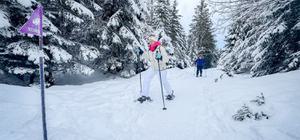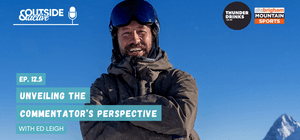6 September, 2023
Concussion can happen to anyone, at any time. Concussions occur frequently in sports (especially contact sports). They are one of the most common injuries to occur from Snowsports, but they can happen from falls, car accidents, and non-contact sports too. Concussion is also the most common type of traumatic brain injury.

Innovations in prevention, detection and recovery have come leaps and bounds in the last few years, as has the knowledge that concussion can seriously damage your quality of life or even kill, if not detected or treated properly.
Those of us that engage in Snowsports, whether for recreation or competitively, are likely to be more at risk from suffering a concussion, or multiple concussions. Unfortunately, there is no such thing as a concussion proof helmet, so it would be naive to think we can prevent concussion, but we can now use innovative tools to diagnose a trauma and get us back to normal.
The purchase of a best fitting mouth guard (a real must for competitive Snowsports)
The purchase of a correct and best fitting helmet for your discipline with “MIPS” (Multi-directional Impact Protection System) built in. You must also renew your helmet if it receives a notable or multiple impact.
The purchase of an Impact baseline test is as important to wearing a helmet. A Baseline test is a 20-minute cognitive test that you sit, whilst you are fit and healthy. You can sit it anywhere with good internet. This should be done with no interruptions or distractions, as if in an exam environment. The tests configuration changes each time so you can never remember or revise for it, as is possible with other tests.
Standard Tests are designed for ages 12 to 59 years of age.
However it is possible to provide pediatric testing for young athletes ages 5 to 11 years.
The test measures Reaction time, Memory capacity, Speed of mental processing and Executive function of the brain in a healthy state.
Tests take about 20 minutes and the test results can then be stored on a Free “ImPact Passport App” which you can download and carry with you on your phone were ever you are.
This app is an invaluable resource, as Athletes can then store all the information of Concussions in one place, which as well as their Baseline test results (their Brains normal function) can be used by a health care provider in consideration of their recovery/back to snow program.
This type of cognitive testing has had a history of being expensive and difficult to find, as with concussion trained health care providers in this field. This thankfully is no longer the case, and they can be purchased for as little as €12.00 each (about £10.00)
This test can also be taken were ever you are, as they are an online test that takes a short time to complete.
It is extremely important to record and keep the details of all concussions you have suffered including dates, symptoms, were you knocked out or not, and how long it took to recover.
It is very important to know that this is a test you take Prior to a concussion whilst in a fit and healthy state. (If you have suffered a concussion in the past, you can still sit a Baseline test, but this should be once you feel you have fully recovered)
If you suffer a concussion, or suspect one, only then would you sit a post Traumatic test so the health care professional can compare the results from your Baseline Test (your own brains normal). This should be carried out about a week after an incident or when the person feels fit enough to sit a test. This allows for the onset of PCS if it might occur.
It is important to know that Post-concussion syndrome “PCS” occurs in 1 out of 5 concussions. PCS is where you do not suffer symptoms until a few days to a week after an incident and it becomes easy not to relate the incident with the growing symptoms.
This is why you should always follow the “If in doubt sit it out” rules after any head trauma however slight.
Every concussion is different; symptoms and recovery are different for everyone. So to have a Baseline of your brains normal cognitive state, is extremely beneficial to compare post traumatic tests with and is the best way to protect your brains health.
The Ellie Soutter Foundation “TESF” has partnered with ImPact, one of the world’s leading online Baseline test providers.
The Ellie Soutter Foundation sell Impact Baseline tests for only €12.00 each (about £10.30) to our knowledge the cheapest baseline tests in Europe. We are also happy to negotiate discounts for Clubs and federations on bulk purchases.
Test results can not be read by the athlete as they would mean little nothing to most of us. Only trained healthcare providers are able read these tests from Neurologists, Doctors, Physiotherapists, and Athletic trainers. The database of which is rapidly growing in the UK and ImPact do offer training to all these professionals.
TESF has also teamed up with Dr David Miller (one of the UK’s leading neurologists) of Cognisant, with clinics across the UK. David and his staff are trained to deliver Impact post traumatic testing. This is a re-sit of the online test along with a 30-minute consultation which can be carried out in clinic or remotely online, to evaluate the symptoms, along with the test results so as, to provide an evidenced based recovery/back to snow program for the athlete.
Dr Miller has set these clinics up as a non-profit to broaden brain health in UK athletes and as such this post traumatic test consultation will cost around £130 - £150 each. Which can then be claimed back on the athlete’s insurance.
Please Protect your brains Health and go to:
https://riding2win.com/product...
#riding2win is the official merchandise platform of The Ellie Soutter Foundation
To find out more about TESF please go to: theelliesoutter.foundation
The purpose of the Foundation is to identify and provide support for young people, who have a demonstrable talent for winter sports and would otherwise be unable to maximise their potential because of a lack of financial resources. This will be achieved by providing grants for equipment, training, travel, competing and accommodation.
Most recent articles by Outside & Active

Brooks supports trail runners to defy limits and empower their trail runs with the new Cascadia 18. The adaptable Cascadia combines DNA Loft v2 cushioning with TrailTack Green grip and a durable upper mesh to handle all terrains, providing necessary comfort and underfoot security on each surface.

Connectivity makes eBiking more customised, convenient and secure.

Various app solutions, interfaces and services as the next step for the eBike experience of tomorrow
Most recent articles in WINTER

I have always wanted to try snowshoeing as I love snow and I love hiking. Snowshoe trekking is a way of venturing deeper into the natural surroundings and tracing your own way through this pristine environment.

Embracing the winter chill is all about mastering the art of staying warm and cozy. As the cold season sets in, it's time to gear up and embrace the great outdoors with a collection of kit that'll keep you snug as a bug in a rug. Remember what the wise woman once said: "There is no such thing as bad weather, just bad equipment."

Ed Leigh is a notable voice in the world of action sports. Having commentated at the Olympics Ed is no stranger to the microphone. He joins Dom on this weeks episode of the Outside & Active Podcast.